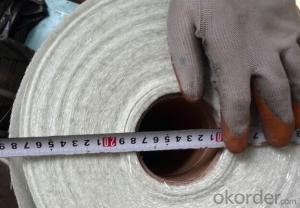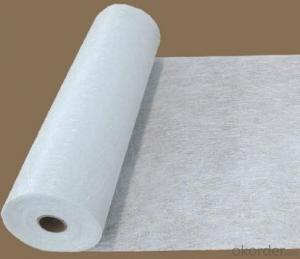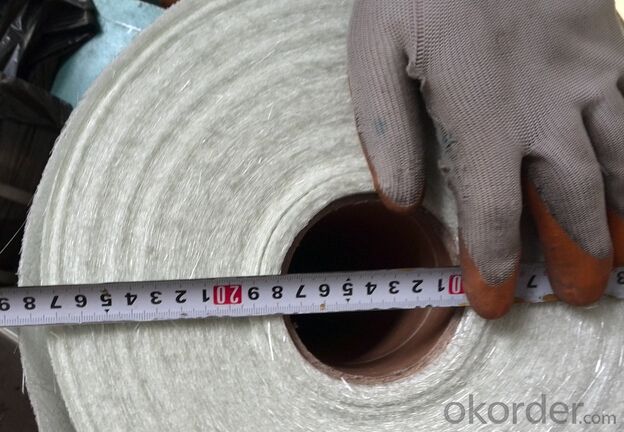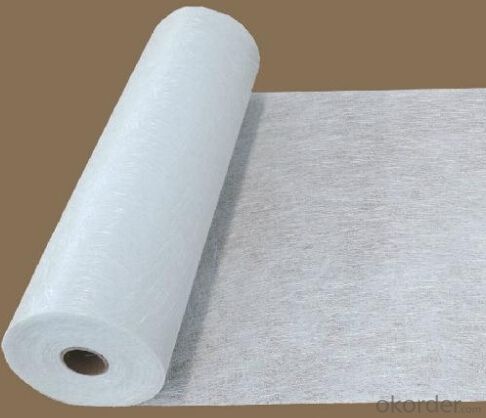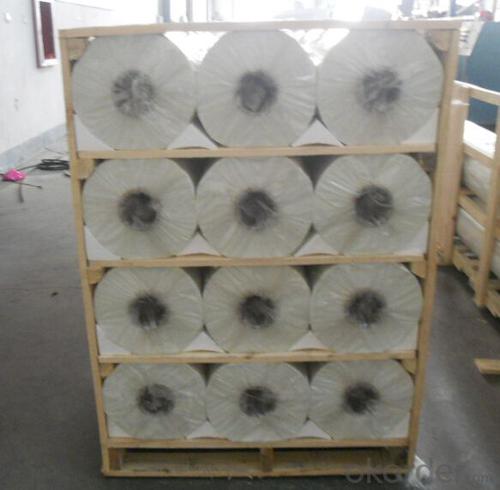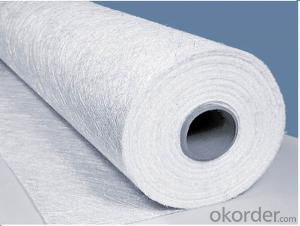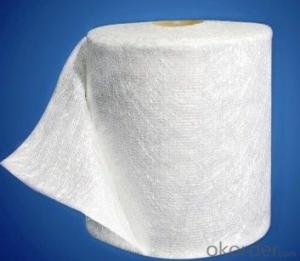Fiberglass Mat Tissue E Glass Fiber Chopped Strand Mat for FRP Tank
- Loading Port:
- Shanghai
- Payment Terms:
- TT OR LC
- Min Order Qty:
- 4000 kg
- Supply Capability:
- 200000 kg/month
OKorder Service Pledge
OKorder Financial Service
You Might Also Like
Introduction of E-glass Chopped Strand Mat
Chopped strand mat is made from fiberglass chopped strands boned with powder binder or emulsion binder.
E glass chopped strand mat is made from fiberglass strands chopped to length and bonded together with powder binder.Chopped strand mat is used primarily for hand lay-up processes, filament winding and press molding of FRP products. Typical products include bathroom accessories, pipe, building materials, automobiles, furniture and other FRP products.
This products ischaracterized bg good combination of resin,easg operation ,good wet strengthretention,good laminate transparency
Chopped strand mat is used primarily for hand lay-up processes, filament winding and press molding of FRP products. Typical products include bathroom
accessories, pipe, building materials, automobiles, furniture and other FRP products.
Features of E-glass Chopped Strand Mat
1.Warp and weft rovings aligned in a parallel,flat manner and uniform tension .
2.Densely alighed fibers,providing high dimensional stability ans easy handing .
3.Good moldability,fast and complete resin wet-out ,enabling high productively .
4.Good transporsision and hign strength of the composite products.
5.Even thickness ,no fuzz ,no stain.
6.Fast wet-out ,products with high strength ,little loss for strength in damp situation.
Features of E-glass Chopped Strand Mat
1.the composit products have high dry and wet tensile strenth and good transparency.
2.Low fuzz ,dirt ,impurity and other stain
Images of E-glass Chopped Strand Mat
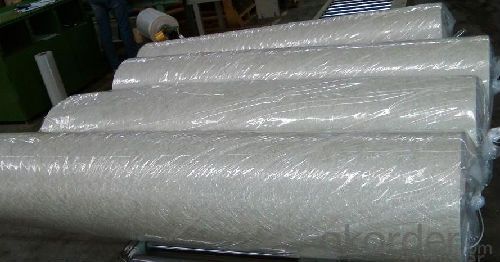
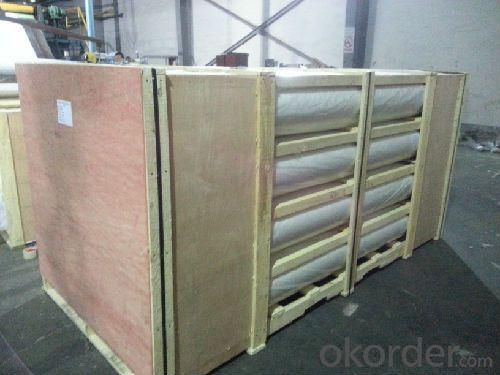
E-Glass Chopped Strand Mat Specification:
Property | Glass type | Weight(g/m2) | Width 200~3300 | Roll Weight | Moisture Content /% | Combustible Content /% | Breakage Strength /N |
Test Method | GB/T 1549 | ISO3374:2000 | ISO3374 | GB/T17470-1998 | ISO3344:1997 | ISO1887:1995 | ISO3342 |
EMC 80 | E-GLASS | 80±16 | ±5 | 6~50 | <0.2< span=""> | 13.6±0.35 | ≥200 |
EMC 100 | E-GLASS | 100±10 | ±5 | 6~65 | <0.2< span=""> | 9.5±0.35 | ≥170 |
EMC 150 | E-GLASS | 150±15 | ±5 | 6~97 | <0.2< span=""> | 8.0±0.35 | ≥40 |
EMC 225 | E-GLASS | 225±22 | ±5 | 6~150 | <0.2< span=""> | 5.0±0.6 | ≥60 |
EMC 300 | E-GLASS | 300±30 | ±5 | 6~180 | <0.2< span=""> | 4.0±0.6 | ≥90 |
EMC 450 | E-GLASS | 450±45 | ±5 | 6~180 | <0.2< span=""> | 3.8±0.6 | ≥120 |
EMC 600 | E-GLASS | 600±60 | ±5 | 6~240 | <0.2< span=""> | 3.6±0.6 | ≥150 |
EMC 900 | E-GLASS | 900±90 | ±5 | 6~190 | <0.2< span=""> | 3.4±0.6 | ≥180 |
FAQ of Chopped strand mat
1. Why Choose us?
CNBM is a stated own company, provide the guarantee for the best quality, best service and safety business.
2. How will we guarantee the quality?
a, ISO 9001-2008 quality control system;
b, Strict and regular quality control in production;
c, Inspeciation when loading into container before shippment;
d, Sample stock for one year for quality tracing and record.
3. What is your MOQ?
Our MOQ is one pallet.
4. Can you provide sample?
Yes, samples are in stock. we can offer free sample for you.
5. Payment terms?
We can accept L/C, T/T etc.
6. Do you offer OEM service?
Yes, we can print customers’ logo on the packaging;
And the size and specification can be produced and design according to your demand.
- Q: What is the tear resistance of fiberglass mat tissue?
- The ability of fiberglass mat tissue to withstand tearing or ripping when exposed to mechanical stress or force is referred to as its tear resistance. Due to its strong and durable nature, fiberglass mat tissue is renowned for its high tear resistance. This tear resistance is typically quantified and reported as tear strength, which measures the force needed to tear the material. The determination of tear strength involves standardized testing methods like the Elmendorf tear test or the tongue tear test. Various factors, including thickness, density, and composition, can influence the tear resistance of fiberglass mat tissue. Nevertheless, fiberglass mat tissue generally exhibits outstanding tear resistance properties, making it an excellent choice for applications where durability and strength are crucial, such as in the construction industry for reinforcement materials or in the production of composite materials.
- Q: How does the fiber distribution of fiberglass mat tissue affect its strength?
- The fiber distribution of fiberglass mat tissue plays a crucial role in determining its strength. A more uniform and evenly distributed fiber arrangement enhances the overall strength and structural integrity of the material. This is because the fibers can effectively distribute and share the applied load, preventing localized stress concentrations and potential weak points. In contrast, an uneven or random fiber distribution may lead to areas with fewer or misaligned fibers, reducing the material's overall strength and making it more prone to failure. Therefore, a well-controlled and uniform fiber distribution is essential for maximizing the strength and performance of fiberglass mat tissue.
- Q: Can fiberglass mat tissue be used for waterproofing?
- Yes, fiberglass mat tissue can be used for waterproofing. Fiberglass mat tissue is a thin, non-woven material that is made from fiberglass fibers. It is commonly used in construction and building applications to provide reinforcement and waterproofing properties. When applied with a waterproofing agent or resin, the fiberglass mat tissue can create a waterproof barrier that helps to prevent the passage of water or moisture. This makes it an effective choice for applications such as roofing, basement waterproofing, and bathroom or shower installations. The strength and durability of fiberglass mat tissue also make it resistant to cracking or tearing, ensuring long-lasting waterproofing protection.
- Q: Is fiberglass mat tissue biodegradable?
- No, fiberglass mat tissue is not biodegradable.
- Q: Can fiberglass mat tissue be used for automotive repairs?
- Yes, fiberglass mat tissue can be used for automotive repairs. Fiberglass mat tissue is a versatile material that is commonly used in various industries, including the automotive industry. It is often used for reinforcing and repairing auto body panels, as well as fixing cracks, holes, and other damages in the vehicle's body. Fiberglass mat tissue is made up of fine fibers that are bound together with a resin. This composition gives it excellent strength and flexibility, making it ideal for automotive repairs. It can be easily shaped and molded to fit different contours and shapes of car parts, ensuring a seamless repair. Additionally, fiberglass mat tissue is lightweight and durable, which is crucial for automotive repairs. It provides excellent resistance against corrosion, weathering, and other external elements, ensuring the longevity of the repair. It also offers good impact resistance, protecting the repaired area from further damage. Furthermore, fiberglass mat tissue is compatible with various types of automotive coatings, such as primers, paints, and clear coats. This allows for a smooth and professional finish after the repair is complete. In conclusion, fiberglass mat tissue is a suitable material for automotive repairs due to its strength, flexibility, durability, and compatibility with automotive coatings. It is commonly used in the industry for reinforcing and repairing auto body panels, fixing damages, and ensuring a seamless finish.
- Q: Does fiberglass mat tissue require any special precautions during transportation?
- Yes, fiberglass mat tissue does require special precautions during transportation. It should be handled with care to avoid any damage or breakage as it can easily tear or become compromised. It is advisable to use proper packaging and secure the material to prevent movement or shifting during transportation. Additionally, protective measures such as wearing gloves, masks, and safety glasses should be taken to avoid any potential irritation or respiratory discomfort caused by the fiberglass fibers.
- Q: Does fiberglass mat tissue provide any thermal insulation?
- Yes, fiberglass mat tissue does provide thermal insulation. Fiberglass is a poor conductor of heat, which means it does not transfer heat easily. When used as a mat tissue, it helps to trap air within its fibers, creating a layer of insulation. This insulation layer acts as a barrier, preventing heat transfer through conduction and reducing thermal energy loss. Therefore, fiberglass mat tissue can be an effective solution for providing thermal insulation in various applications, such as construction, automotive, and aerospace industries.
- Q: Can fiberglass mat tissue be used for attic insulation?
- Fiberglass mat tissue is not typically used as a primary insulation material for attics. While it does offer some thermal resistance, it is generally designed to be used in conjunction with other insulation materials, such as fiberglass batts or blown-in insulation, to enhance their performance. Fiberglass mat tissue is often used as a facing material for insulation products, serving as a vapor barrier or as a reinforcement layer. It can help improve the durability and moisture resistance of the insulation, but its main purpose is not to provide significant thermal insulation on its own. When insulating an attic, it is more common to use materials specifically designed for thermal insulation, such as fiberglass batts, cellulose, or spray foam insulation. These materials have higher R-values and are more effective at reducing heat transfer, which is crucial for maintaining a comfortable indoor temperature and energy efficiency. In summary, while fiberglass mat tissue may have some insulating properties, its primary role is to enhance the performance of other insulation materials rather than being used as the sole insulation for an attic.
- Q: How does the porosity of fiberglass mat tissue affect its performance?
- The porosity of fiberglass mat tissue plays a significant role in determining its performance. Porosity refers to the density of tiny pores or holes in the material, which affects the material's ability to absorb and hold fluids, as well as its strength and durability. Firstly, the porosity of fiberglass mat tissue influences its absorption capability. A higher porosity allows the tissue to absorb more fluids, such as resins or binders, during the manufacturing process. This absorption is crucial as it ensures better adhesion between the fiberglass mat and the bonding material, resulting in a stronger and more durable end product. Secondly, the porosity of the fiberglass mat tissue affects its strength and stiffness. Lower porosity generally indicates higher density and a more tightly packed structure, resulting in increased strength and stiffness. This is beneficial in applications where the material needs to withstand high mechanical stresses or act as a structural component. Additionally, the porosity of the fiberglass mat tissue impacts its thermal and acoustic insulation properties. Higher porosity typically leads to better thermal and acoustic insulation due to the increased number of air pockets within the material. These air pockets act as barriers, reducing heat transfer and sound transmission, making the material suitable for applications requiring thermal or acoustic insulation. Furthermore, the porosity of fiberglass mat tissue can influence its filtration capabilities. If the material has a high porosity, it can trap and hold particles more effectively, making it suitable for use in filtration systems. Conversely, a low porosity may allow for better flow rates, making it more suitable for applications where fluid permeability is important, such as drainage applications. In summary, the porosity of fiberglass mat tissue affects its performance in various ways. It determines its absorption capability, strength, stiffness, thermal and acoustic insulation properties, filtration capabilities, and fluid permeability. Therefore, understanding and controlling the porosity of fiberglass mat tissue is essential to ensure optimal performance in a wide range of applications.
- Q: Is fiberglass mat tissue resistant to acids?
- Yes, fiberglass mat tissue is generally resistant to acids. Fiberglass is known for its excellent corrosion resistance properties, and this includes resistance to various acids. The combination of fiberglass mat and resin creates a strong and durable material that can withstand exposure to a wide range of chemicals, including acids. However, it is important to note that the specific type and concentration of acid can still affect the resistance of fiberglass mat tissue. In some cases, certain highly concentrated or aggressive acids may cause damage or degradation to the material over time. Therefore, it is always advisable to consider the specific acid being used and consult the manufacturer's recommendations for compatibility before exposing fiberglass mat tissue to any acidic environment.
Send your message to us
Fiberglass Mat Tissue E Glass Fiber Chopped Strand Mat for FRP Tank
- Loading Port:
- Shanghai
- Payment Terms:
- TT OR LC
- Min Order Qty:
- 4000 kg
- Supply Capability:
- 200000 kg/month
OKorder Service Pledge
OKorder Financial Service
Similar products
Hot products
Hot Searches
Related keywords
